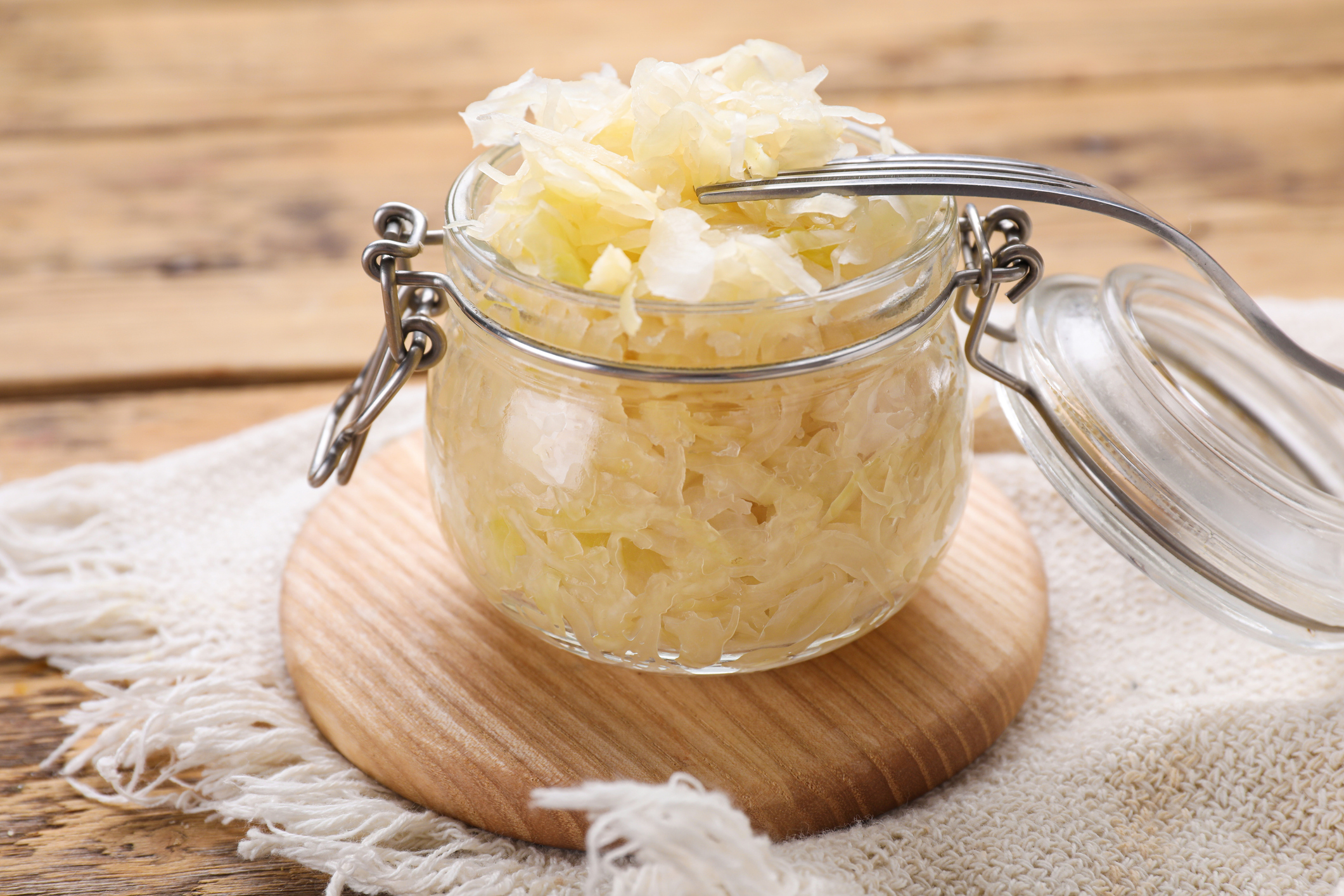Get Easy Health Digest™ in your inbox and don’t miss a thing when you subscribe today. Plus, get the free bonus report, Mother Nature’s Tips, Tricks and Remedies for Cholesterol, Blood Pressure & Blood Sugar as my way of saying welcome to the community!
The fermented, gut-loving benefits of sauerkraut

Eat right. Exercise. Get enough sleep. Don’t smoke or drink. That “healthy lifestyle” list just keeps getting longer.
Wouldn’t it be great if there were just one thing we could do (or take) that could grant us complete health and well-being?
The unfortunate truth is that no such “magic bullet” exists. But there is one thing that comes close… fermented foods.
Foods like yogurt, kefir, kimchi, miso and even coffee (yes, it’s fermented to a degree) have been linked to lower rates of diabetes and heart disease, as well as a reduced risk of depression, anxiety and obesity. They also help blood pressure, cholesterol, osteoporosis and digestion. They can even help fight the flu!
These benefits are unique to fermentation, which produces bioactive compounds, including friendly bacteria that help support our gut microbiome. In turn, the gut microbiome is linked to the health of many other body systems.
As this pathway to health has become known in wellness circles, there has been a trend toward fermented health foods. But there’s an old-fashioned, fermented “condiment” that can be just as good for your gut…
Sauerkraut benefits support intestinal cells
A team of researchers from the University of California, Davis, examined how the metabolites in sauerkraut — a popular American hot dog topping — compared with those in the raw cabbage it’s made from.
They compared raw cabbage, sauerkraut and the liquid brine left behind from the fermentation process to see whether sauerkraut’s nutrients could help protect intestinal cells from damage related to inflammation, that can disrupt the intestinal barrier.
The results showed that sauerkraut helped maintain intestinal cell integrity, while raw cabbage and brine did not. The researchers noted that they found no noticeable difference between store-bought sauerkraut and the “homemade” version they produced in the lab.
“Some of the metabolites we find in the sauerkraut are the same kind of metabolites we’re finding to be made by the gut microbiome, so that gives us a little more confidence that this connection we found between the metabolites in sauerkraut and good gut health makes sense,” says study author Maria Marco, a UC Davis professor. “It doesn’t matter, in a way, if we make sauerkraut at home or we buy it from the store; both kinds of sauerkraut seemed to protect gut function.”
When performing a chemical analysis, the researchers discovered fermentation changes the nutritional profile of the cabbage, increasing beneficial metabolites such as lactic acid, amino acids and plant-based chemicals linked to gut health. These changes help explain why fermented foods are connected with digestive benefits.
The findings also revealed that intestinal barrier-protective compounds are consistently enriched during cabbage fermentations, irrespective of the scale or microbial additions.
“Along with eating more fiber and fresh fruits and vegetables, even if we have just a regular serving of sauerkraut, maybe putting these things more into our diet, we’ll find that can help us in the long run against inflammation, for example, and make our digestive tract more resilient when we have a disturbance,” Marco says.
Marco says she and fellow author Lei Wei, a postdoctoral researcher in her lab, identified hundreds of different metabolites produced during sauerkraut fermentation. They are now working to determine which ones play the most significant role in supporting gut health in the long term.
How to add sauerkraut to a healthy diet
According to Marco, the researchers’ next step is to conduct human trials to see if the protective metabolites found in sauerkraut can have the same positive effects shown in the lab when included in everyday diets.
“A little bit of sauerkraut could go a long way,” she said. “We should be thinking about including these fermented foods in our regular diets and not just as a side on our hot dogs.”
Hot dogs, sausages and Reuben sandwiches are all made with processed and red meats, which are strictly verboten for a healthy diet.
It’s also important to know that not all store-bought sauerkraut is created equal. Canned or shelf-stable brands have been heat pasteurized and may contain additives. Pasteurization can kill the probiotics. So look for store-bought saurkraut in the refrigerated section. Making it at home is also pretty easy and recommended.
So, what’s the best way to add sauerkraut to your diet? You can put a scoop on the side of pretty much any meal, but if you really want to jazz things up, try the following:
- Top your morning eggs with sauerkraut
- Add it to your breakfast or lunch burrito
- Mix it with a smashed avocado to create a dip
- Blend it with hummus as a substitute for the acidity of lemon juice
- Chop it into your salsa
- Sprinkle it over a salad
- Combine it with tuna or chicken salad for a tasty sandwich
- Add it to your grilled cheese sandwich on whole-grain bread
Editor’s note: Did you know that when you take your body from acid to alkaline you can boost your energy, lose weight, soothe digestion, avoid illness and achieve wellness? Click here to discover The Alkaline Secret to Ultimate Vitality and revive your life today!
Sources:
The gut health benefits of sauerkraut — EurekAlert!
The fermented cabbage metabolome and its protection against cytokine-induced intestinal barrier disruption of Caco-2 monolayers — Applied and Environmental Microbiology
20 Ways To Eat Sauerkraut — Fermented Food Lab














